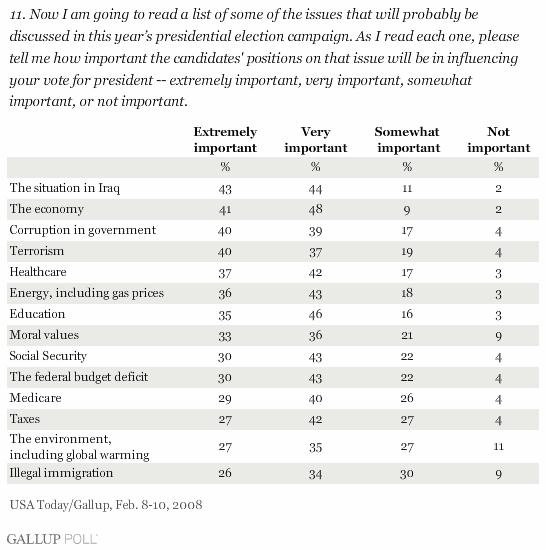PRINCETON, NJ -- More than 40 candidate debates and forums have been held in the 2008 presidential election cycle thus far -- with at least 20 for each party. Factoring in the speeches, interviews, and position papers coming out of the campaigns, there has already been a tremendous flow of information on national issues, and the general election campaign hasn't started.
This may be fortunate, because new Gallup data suggest that Americans are interested in having a lot of material covered as they make their voting decisions. According to the latest USA Today/Gallup poll, most Americans rate candidates' positions on 14 issues -- all of the issues listed in the Feb. 8-10 poll -- as either "extremely" or "very" important in their decision-making in choosing a new president. Although none of the issues is considered extremely important by a majority of Americans (the situation in Iraq registers the highest level, with 43%), all of them are rated as either extremely or very important by at least 60%.
The situation in Iraq and the economy tie as the issues Americans say are most important to their vote; the environment and illegal immigration tie for the least important.
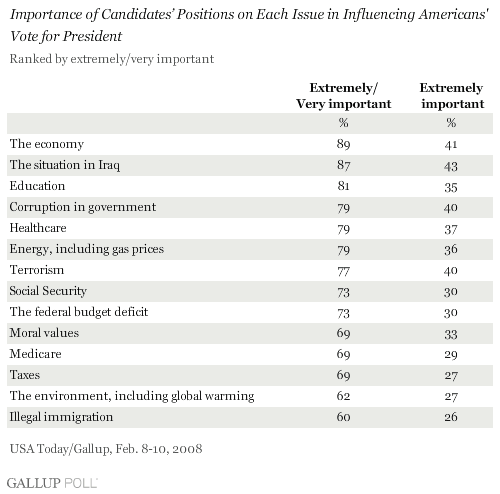
Positions on Terrorism Most Important to Republican Voters
With Hillary Clinton and Barack Obama still battling for the Democratic nomination, and John McCain yet to officially wrap up the Republican nomination, the current discussion of issues in the election remains focused on how the candidates' positions compare with what voters in their respective parties are looking for.
Some of the strongest distinctions among issues within each party group are seen at the "extremely" important level. On this basis, the top issue for Republicans is clear: terrorism. Fully half of Republicans say the candidates' positions on terrorism are extremely important to their vote, suggesting a possible reason why McCain, with his military background and tough anti-terrorist positions, has been successful in recent weeks at filling the void created when Rudy Giuliani's campaign deflated early in the primary season.
At least a third of Republicans rate an assortment of other issues as extremely important, led by moral values with 39%. The relatively high ranking of this issue can help explain why Mike Huckabee has continued to present a challenge to McCain in some states, and why he has pledged to stay in the race even if it is only to give voters a clearly conservative pro-life alternative to McCain.
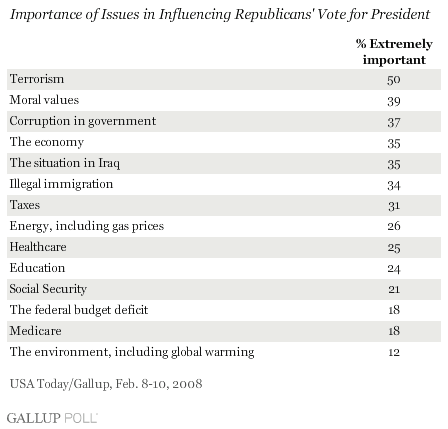
Numerous Issues Influential to Democrats
For Democrats, the top issue of importance to their vote is a tie between the situation in Iraq and healthcare -- Iraq being an issue that Obama and Clinton are highly competitive on, and the latter one that most Democrats perceive is a strength of Hillary Clinton.
However, the economy, education, government corruption, and energy all follow closely behind these two in perceived importance, and at least a third of Democrats rate an additional five issues as extremely important. Of interest are the relatively low positioning of terrorism and moral values on this issues list among Democrats, a sharp contrast to their high rankings among Republicans.
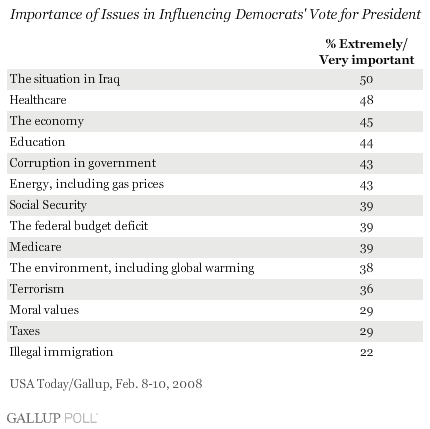
Economy and the War Loom Large for Independents
Come the fall, both nominees will be striving to attract independent swing voters. Right now, the most highly rated issues for independents are the economy, the situation in Iraq, and government corruption -- all issues that rank fairly high among Democrats as well. However, the more Republican-oriented terrorism issue ranks a close fourth.
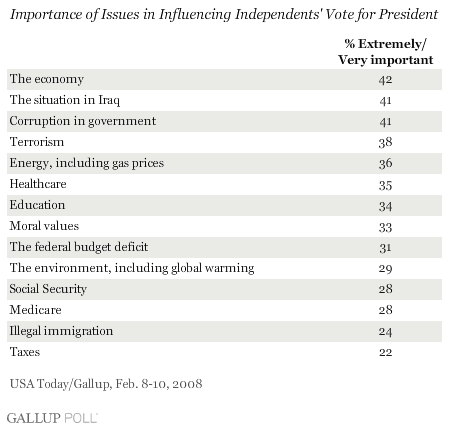
Bottom Line
In general, most Americans are reluctant to say that any of the issues tested in the new survey are less than very important to their vote for president this year. However, on a relative basis, the economy and Iraq are likely to be most influential. These are top-rated by Democrats as well as independents, and are fairly important to Republicans.
Republicans' particular focus on terrorism was widely considered to be one of the factors that helped George W. Bush activate his "base" in 2004 and win re-election -- and is likely to be important again this fall in energizing Republicans around their party's nominee. No other issue so unites Republicans. Democrats express high interest in the candidates' positions on numerous issues, but as with Republicans, these are issues likely to further attach Democrats to their own party.
The key to how the issues play out in the election could be whether political independents are more likely to favor the Republican or the Democratic candidate's approach to their key issues, which at the moment appear to be the economy, Iraq, and government corruption, with terrorism not far behind.
Survey Methods
These results are based on telephone interviews with 1,016 national adults, aged 18 and older, conducted Feb. 8-10, 2008. For results based on the total sample of national adults, one can say with 95% confidence that the maximum margin of sampling error is ±3 percentage points.
For results based on the sample of 305 Republicans or Republican leaners, the maximum margin of sampling error is ±6 percentage points.
For results based on the sample of 353 Democrats or Democratic leaners, the maximum margin of sampling error is ±6 percentage points.
For results based on the sample of 351 Democrats or Democratic leaners, the maximum margin of sampling error is ±6 percentage points.
Interviews are conducted with respondents on land-line telephones (for respondents with a land-line telephone) and cellular phones (for respondents who are cell-phone only).
In addition to sampling error, question wording and practical difficulties in conducting surveys can introduce error or bias into the findings of public opinion polls.
